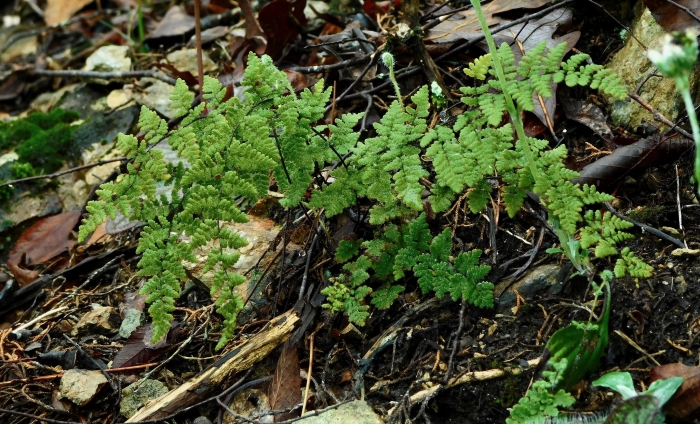Hairy Lip Fern
(Myriopteris lanosa)
Hairy Lip Fern (Myriopteris lanosa)
/
/

Michael J. Papay
CC BY 4.0
Image By:
Michael J. Papay
Recorded By:
Copyright:
CC BY 4.0
Copyright Notice:
Photo by: Michael J. Papay | License Type: CC BY 4.0 | License URL: http://creativecommons.org/licenses/by/4.0/ | Rights Holder: Michael J. Papay | Publisher: iNaturalist | Date Created: 2024-03-23T09:06:40-07:00 |























Estimated Native Range
Summary
Myriopteris lanosa, commonly known as hairy lip fern, is a perennial herbaceous fern native to rocky outcrops, cliffs, and bluffs within deciduous forests of the central and eastern United States. It is often found in the Appalachian Mountains, thriving in shallow, dry, well-drained, acidic soils. This fern is characterized by its sparsely hairy leaves and stems, with fronds that unfurl from curled fiddleheads. Mature fronds typically range from 2.8 to 19.7 inches in length and form dense clusters, contributing to its lush appearance in the landscape.
The hairy lip fern is valued for its unique texture and ability to grow in challenging rocky sites, making it a suitable choice for rock gardens, shaded borders, and naturalized woodland settings. Its dark brown to purplish-black stipe, or stem, is adorned with long, persistent hairs, and the bipinnate-pinnatifid blade has lanceolate or linear-oblong segments. The sori, which contain the spores, are covered by false indusia, a specialized leaf tissue. While the species is considered globally secure, it is threatened in some states due to habitat loss. In cultivation, it requires minimal maintenance, preferring part shade to full shade and can tolerate drought once established.CC BY-SA 4.0
The hairy lip fern is valued for its unique texture and ability to grow in challenging rocky sites, making it a suitable choice for rock gardens, shaded borders, and naturalized woodland settings. Its dark brown to purplish-black stipe, or stem, is adorned with long, persistent hairs, and the bipinnate-pinnatifid blade has lanceolate or linear-oblong segments. The sori, which contain the spores, are covered by false indusia, a specialized leaf tissue. While the species is considered globally secure, it is threatened in some states due to habitat loss. In cultivation, it requires minimal maintenance, preferring part shade to full shade and can tolerate drought once established.CC BY-SA 4.0
Plant Description
- Plant Type: Fern
- Height: 0.5-1 feet
- Width: 1.25-1.5 feet
- Growth Rate: Slow
- Flower Color: N/A
- Flowering Season: Non-Flowering
- Leaf Retention: Deciduous
Growth Requirements
- Sun: Part Shade
- Water: Medium
- Drainage: Fast
Common Uses
Border Plant, Low Maintenance, Rock Garden
Natural Habitat
native to rocky outcrops, cliffs, and bluffs within deciduous forests of the central and eastern United States
Other Names
Common Names: Woolly Lip Fern
Scientific Names: , Myriopteris lanosa, Adiantum vestitum, Allosorus lanosus, Aspidium lanosum, Cheilanthes lanosa, Cheilanthes lanosa, Cheilanthes lanosa var. minor, Cheilanthes vestita, Cincinalis vestita
GBIF Accepted Name: